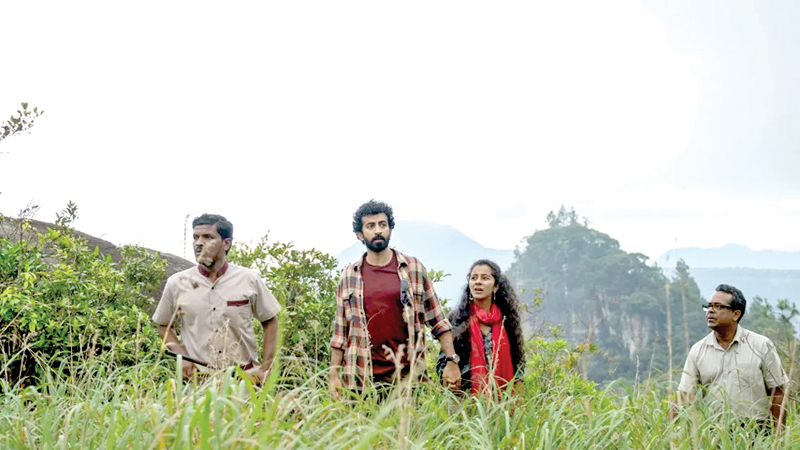“Paradise” is a 2024 Sri Lankan-Indian co-produced drama film co-written and directed by Prasanna Vithanage. The film is presented by Mani Ratnam and Siva Ananth under the Madras Talkies banner and is produced by Newton Cinema. It stars Roshan Mathew, Darshana Rajendran, Shyam Fernando, and Mahendra Perera, and tells the story of a married couple whose anniversary vacation goes awry in Sri Lanka.
The film had its world premiere at the 28th Busan International Film Festival on October 7, 2023, where it won the Kim Jiseok Award.
****
 “Paradise,” the highly acclaimed latest cinematic venture by renowned Sri Lankan filmmaker Prasanna Vithanage, recently premiered on the silver screen worldwide. In this review, I hope to delve into the profound depths of his artistic vision behind the film. Celebrated as a trailblazer in Sri Lankan cinema’s third generation, Vithanage is known for challenging conventional norms and exploring the complexities of human subjectivity, with a particular focus on female perspectives and societal structures.
“Paradise,” the highly acclaimed latest cinematic venture by renowned Sri Lankan filmmaker Prasanna Vithanage, recently premiered on the silver screen worldwide. In this review, I hope to delve into the profound depths of his artistic vision behind the film. Celebrated as a trailblazer in Sri Lankan cinema’s third generation, Vithanage is known for challenging conventional norms and exploring the complexities of human subjectivity, with a particular focus on female perspectives and societal structures.
The main protagonists of “Paradise,” a young Malayali middle-class couple named Keshav and Ammu, travel to Sri Lanka for a short, budget-friendly getaway, seeking the lush greenery and true paradise the country has to offer. At first glance, the couple appears calm, seemingly accepting each other’s existence. Most importantly, Ammu’s silent and serene demeanor suggests that she is a very agreeable wife, until she completely surprises the audience in the latter part of the film.
The young fictional couple enters the “paradise” during a period of intense political turmoil that was present in Sri Lanka at the time. The film was shot amidst this crisis, with the director showcasing the originality of the narrative by bringing this fictional couple to life within the context of the real situation. The country was experiencing a collapsed economy, with a severe shortage of fuel and electricity. As a result, all economic activities, including daily household tasks, had come to a standstill. The entire nation, regardless of social class, had been plunged into a state of despair, with people grieving, fighting, and demanding that the government and authorities restore their shattered consumerist lifestyles.
Against this backdrop, the Indian middle-class couple is eagerly awaiting a call to confirm a project that promises them greater financial rewards and economic stability. The first plot twist occurs on the very first night of their vacation when they are robbed of their phones and laptops, shattering their plans and expectations. This incident transforms their holiday into a cat-and-mouse game between the thieves and the police, revealing the corrupt and inhumane bureaucratic system of the country, as well as the enduring power struggle inherent in a marriage, which has become more prominent than anything else in contemporary society.
Grand narrative
Before delving into the main premise of the film, it is interesting to analyse the stunning natural landscape set in Sri Lanka, where the main couple travels and stays. While on vacation, they are mesmerised by the beauty of nature, and the story intertwines with the Hindu myth of Ravana, a narrative commonly shared between Sri Lanka and India. As the couple explores various historical sites related to this myth, they paradoxically spend most of their time on their phones and engrossed in work on their laptops.
In Sri Lanka, as well as in other parts of Asia, both the captivating myths and the region’s natural beauty profoundly impact its people, drawing them into a world of larger-than-life narratives. It is evident that many well-recognised films and literary works from this region often convey personal experiences against grand narratives. The stories from this part of the world have been presented to and seen by other parts of the world through an anthropological lens. Contemporary life, with its struggles and conflicts, has been portrayed primarily without much personal character detail, situated within the context of significant historical narratives.
Cultural backwardness
Aside from its multiple layers of narrative, the main premise of the film, as I perceive it, sheds light on the collapse of the concept of ‘marriage’ in contemporary consumerist society. As one of the oldest institutions of human civilisation, the ‘family’ has now been utterly shattered and its agency profoundly challenged. This transformation primarily arises from the changing role of women—once considered the foundation of the family institution—who, through the global women’s empowerment agenda, have now become the sole ‘devotees’ of consumerism. In the second decade of the twenty-first century, it is evident that the South Asian region has become economically modern, with regional expansion in information technology, advanced capital accumulation, and a shift from printed money to digital currency dominating the economy, among other developments. However, to support this economic modernity, cultural and political advancement is crucial, but these areas remain very backward in this region.
One major reason for the backwardness in cultural advancement is the inability to differentiate between historical myths and reality. It is crucial for any nation to explore the historical myths of the past to harness their potential for cultural advancement, which directly influences the lifestyle of contemporary society in accordance with its economic progress. The failure to distinguish between these two factors has hindered the socio-cultural development of the region and the subjectivity of South Asian women is deeply influenced by these larger-than-life historical mythologies.
Collapse of ‘Marriage’
Over the past few decades, women’s empowerment has emerged as a crucial socio-political agenda globally, particularly in Asia, where discussions about women’s involvement in economic development have come to the forefront. Consequently, the presence and importance of women’s engagement in the economy have been progressively recognised, and contemporary society now strongly advocates for the empowerment of femininity. This shift has had a significant impact, as the consumerist system welcomes feminine qualities while sidelining masculinity.
However, these gradual changes, while boosting the economy and benefitting individual households through the empowerment of women, have often overlooked the importance of socio-cultural advancement. As a result, relationships between close partners, such as husbands and wives, have transformed into rivalries, turning a once supportive connection into an obstacle to each other’s progress and freedom.
In this context, analysing the subjectivity of Ammu’s character in the film “Paradise,” we see that she is portrayed as a silent, agreeable wife who undergoes a shocking transformation into a “husband-killer” in a surprising plot twist at the end of the film. This shift sheds light on her accumulated unconscious rage throughout her marriage, which is ultimately triggered by a human bullet that ends her husband’s life.
Throughout the film, Keshav’s dominant behaviour in decision-making, both in social and personal matters, is prominently displayed. In contrast, Amu’s silence is often interpreted as agreement, reflecting the expected behaviour of South Asian women. A surprising turn of events occurs during a riot when Amu fires a bullet at Keshav, prompting the audience to reconsider the untold story behind her silence—one that she herself is both unconscious of and puzzled by. Her unconsciousness regarding her own detrimental action is highlighted in the final scene, where Amu is leaving for the airport alone with the tour guide. During their conversation, Amu said that she doesn’t really understand what happened; she simply pulled the trigger. While the tour guide of the film and the audience clearly witnessed her firing the gun at Keshav, the tour guide, in his statement at the police station, claimed that it was merely an accident.
For me, the premise of the film is to bring Amu’s detrimental yet unconscious actions to the forefront, rejecting the notion that they should be dismissed as mere accidents.
This brutal and revealing realisation underscores the urgent need to reimagine and redefine the traditional roles of husband and wife in light of the new norms of a highly consumerist society.






